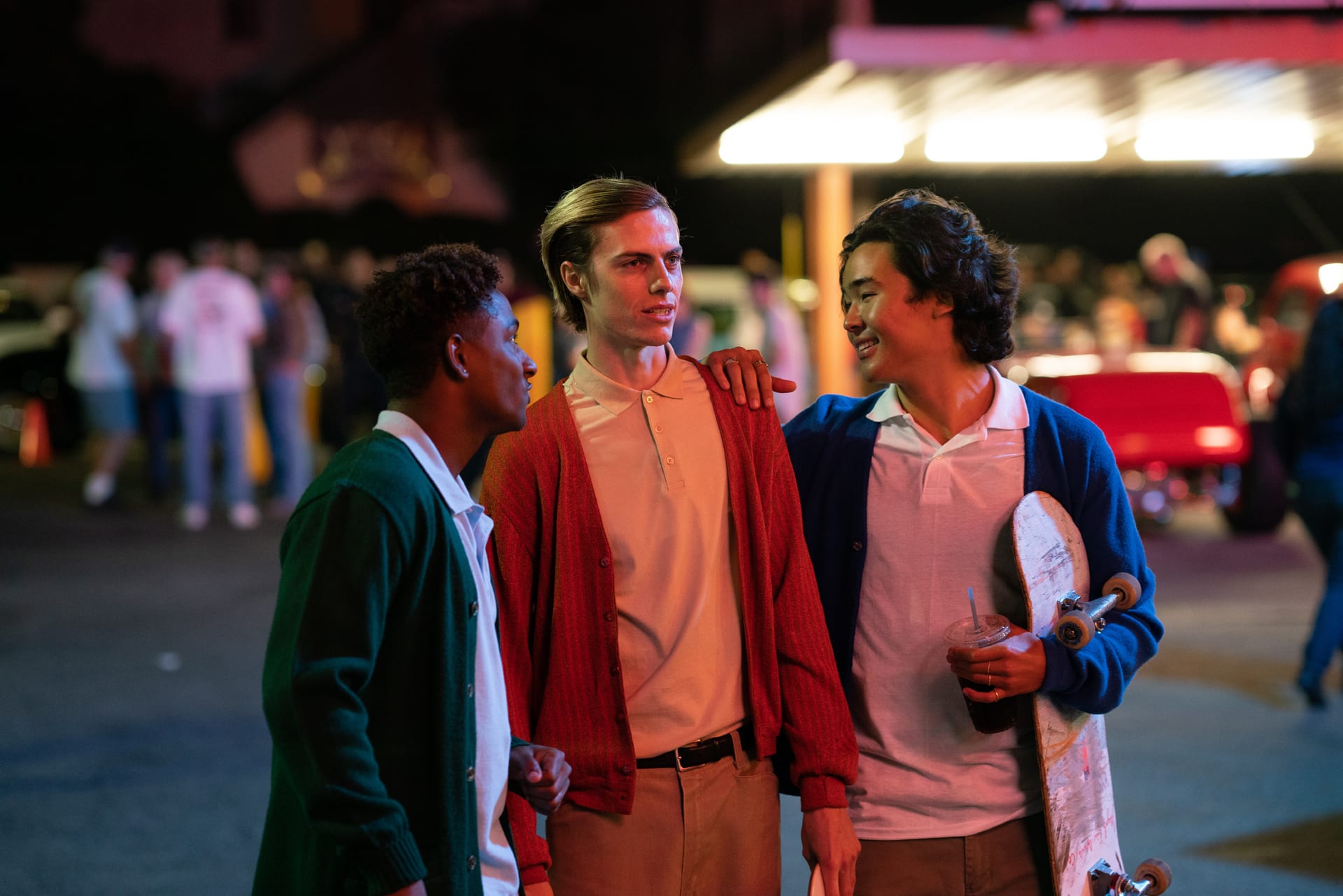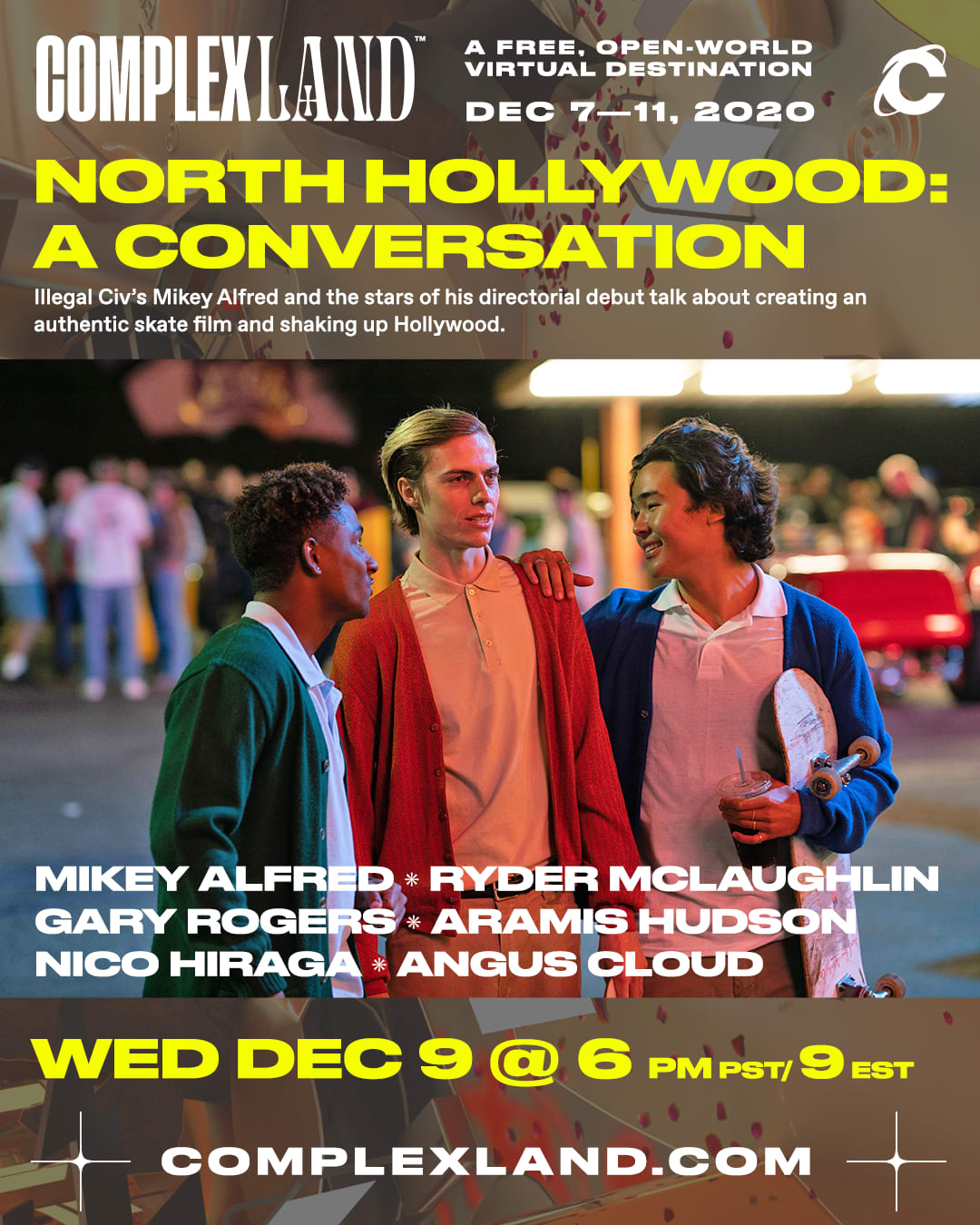
For a guy who's on the cusp of releasing his first feature film as a director, 25-year-old Illegal Civ founder Mikey Alfred has been doing this for most of his life. You may not get it if you aren't a skater or didn’t grow up around skate culture, like I did. For them, the grind is real. That's not even some cute way of bringing in a reference to what the homies skate on, either. If you watched Sunny Suljic in A24's Mid90s (which Mikey is a producer on), there's a scene where his character Stevie is in his backyard, spending what feels like hours perfecting one trick. That's the lifestyle—you get on the board, you work to perfect a trick, then you celebrate and move onto the next one. Filming that process is how we have the amazing catalog of skating videos that folks like Mikey pride themselves on. Of course someone with his vision would take that grind, and with a little bit of home training, turn it into a career in cinema.
After directing documentaries for Tyler, The Creator, doing a little bit of acting, and again producing Jonah Hill's Mid90s, Mikey's finally crafted his debut feature, North Hollywood. Loosely based on his life—primarily living the life of a skater who's trying to turn pro—as well as his relationship with his father, the film stars Ryder McLaughlin (Mid90s), Vince Vaughn(!), Miranda Cosgrove(!!), and faces you've definitely seen in some of your recent favorites—Angus Cloud (Euphoria) and Nico Hiraga (Booksmart). With all of this going for him, you'd think that it'd be easy to get this film picked up and released to the masses, right? Wrong. Even with Pharrell Williams and Noah Centineo on as producers, with the legendary Tony Hawk singing its praises, North Hollywood was rejected by Sundance and every distributor Mikey brought the film to—even those who praised it.
Those bumps in the road haven't deterred Mikey, though. Complex caught up with the young visionary, as he detailed not only how the seeds of his cinematic dream were sown early, but how they sprouted into the opportunities that lead him to today. Ahead of the exclusive North Hollywood trailer release and panel at ComplexLand on Dec. 9, Mikey shares his story.
Talk about becoming a filmmaker. Was it because you were skating and living that life or was there always that appreciation for movies and cinema?
It's both. My mom, she was the personal assistant for Robert Evans for 37 years, rest in peace to him. He produced The Godfather, Rosemary's Baby, Chinatown. So as a kid, my parents would take me to go see SpongeBob and Disney movies and stuff, but I remember growing up, being sat down and forced to watch The Godfather and some other classic movies that my mom's boss made. And I have an uncle, his name is Kevin Swain, and he is a director who does a lot of music videos and live shows for people. So, since the day I was born, I was always around it and I always understood that it was possible and that it was very real. I would see people on TV and then see them in my backyard or see them at my mom's boss's house. It made me look at entertainment and the world different. Right? Where it's like, "Oh, those aren't just these faceless, human-less characters up there. Those are actual people who do a job and are passionate about putting truth and telling stories up on the screen."
When I started skating, at first I was just skating and it was me and the homies, I was 10 years old, a little kid in middle school. When everyone started to get real good, going off the 10 stairs, going off all the different sets, I would try and get broke and get hurt. And it's like, "Okay, I love skating and I still want to be involved 100 percent but I can't be fucking jumping off 10 stairs and stuff my whole life." Like, "I got to figure something else out." You know?
I picked up the camera. My uncle Kevin let me use his camera a lot. There was a guy named Kyle Adams who lived a few blocks from me and he was the manager of Active skate shop in Burbank, he also had a DX-1000 that I would borrow. Once I started to get good at filming skating—and I'm talking 11, 12 years old—Kyle took me under his wing, started giving me free boards, free shoes, and I would hook up all my little homies in North Hollywood. And at the beginning, we just made DVDs and only the kids in the neighborhood knew about the skate videos. And in 2009, 2010, when YouTube became a thing, we started uploading. And then, it opened past North Hollywood, past the neighborhood, and that's when I started to get to know kids all over LA. Ever since then, it's history and now we're making features.
Right. That makes sense, and it's dope to hear that it wasn't just, "Oh, I loved filming because I was skating and wanted to do it." So I guess the question then is, how long had you been holding on to the idea of the film that became North Hollywood?
My whole life. Literally, since birth. You know?
When did you decide to say, "Okay, let's actually try and get this shit done"?
Well, my producer Malcolm Washington, we grew up on the same street. I lived in one cul-de-sac, he lived in the other. And when he got to be 10, 11, 12, 13, something around that zone, they moved to a different part of LA and I didn't really see him that much anymore. Years later, we linked back up. We made a short film series called Summer of '17, and that was sort of the first real practice.
After Summer of '17, I produced Mid90s, where I got to see, from A-to-Z, a movie be put together. Not really in the editing because I got left out of that part a little bit, but the scripts and the shooting, the casting, I was there 100 percent. So, I took my story, my real life. From being in high school, all I did was skate, skate, skate. Post-high school, I'm making shorts, trying to practice a little. I produced a big movie, A24, fucking came out in theaters, the whole thing. After all that, I felt like, "All right, bro, there's nothing else to wait for. I got the fucking story to tell, I know what I want to say. Now I know how to do it." I did it, kind of, just as a producer.
Talk about how you got involved with Mid90s, specifically. Did you know Jonah? Was that something that they just knew that you were the guy, so they pulled you in? How did that come about?
So, Jonah was a fan of my skate videos from YouTube. I feel that he grew up skating a little bit as a really young kid and then, obviously, he went and became an actor and stuff, but he used his privilege, all these years later, to make a movie about something he has been an observer and interested in, skateboarding. And you bring someone like Mikey Alfred on, obviously I can be of service creatively, with the cinematics in the movie because of Evans and all the research and passion I've put into that part of it. And then, I can be very helpful in the skateboarding aspect, whether it's casting or just getting it to be authentic. That was the value I served on that film. There's not that many movies about skating, it's really annoying. But we did that shit and we did it right, we did it good. It looks good, it's not cheesy and it's with big people.
So when it comes to now getting North Hollywood made, was it a situation where you got your feet wet on the Mid90s set and was like, "Okay, I learned what I can learn from this, now let me just go out and do it." Or do you think you could have done it without that?
I mean, who knows? Right? To say, could you do it with or without, that doesn't really matter. We did it. All my movies since I've been 10 have been either just straight-up skate videos or... Even when I did the docs with Tyler and stuff, I always put skaters in it, put at least a couple of clips in there. So after Mid90s, I have to move on and do that more, so it's really me just following my passion. It's not like I learned everything I could and now I'm going to do my own thing. Me following my strengths and following my heart is what got me Mid90s. You know? Not a want to get information, even though I got a lot of that. Because that's what I needed. I had all the heart, I just needed the how.
Did you make sure you got educated on the art of filmmaking in preparation for North Hollywood? Or was that passion [for filmmaking] something that also bled into you just picking up books on blocking shots or cinematography?
Oh, for sure. And just watching mad movies before making North Hollywood I watched this movie called This Sporting Life over and over, love that flick. Elia Kazan, super inspiring for North Hollywood. This guy, Joseph Mankiewicz. So, he's a really dope director, I love all of his movies. His big homie is a guy named Darryl Zanuck, he's the guy who started Fox back in the day. Darryl Zanuck was my mom's boss's big homie. They have a great movie called All About Eve.
Ah, classic.
Classic, classic, classic. And then, I love Scorsese, I feel like people can see that, obviously, from the film. I love Ryan Coogler, I think he's one of the dopest directors right now, of our time. I love a lot of these people. I love Greta Gerwig, I feel like Lady Bird is dope as fuck, Little Women is dope as fuck, she's one of the true filmmakers of right now.

What was it like being on set with Vince Vaughn as a first-time film director?
I feel, with Vince, it was less about trying to convince him or try to sell him or anything. It was more about like, "Look, man, I want to make a movie that's really honest about a father and son relationship when the son wants to chase his passion and the dad wants him to live out this fantasy of elevating their family to the next level, which in his head is college." He's trying to live vicariously through the kid. You know? And that was the seed of the idea. And I feel everyone can relate to that. Everybody in their own life has had a parental figure who wanted them to do something and the kid wanted to do something else.
Even among friends, you have that sometimes. Where there's a big homie who has a certain vision and then the younger person is like, "No, man, I see it this way." And that causes people to bump heads. I feel that Vince, similar to me, he has an overarching goal of making great art and making great entertainment for the fans that normal people can really relate to and love. And once we connected on that common goal and were able to just discuss human topics that has to do with the movie, man, that just made it to where we're just connected. And it's not even like, "Oh, come do a movie because you're going to make money." Or, "Come do a movie because it's going to make you look good," or something. It's like, "Let's just go make some great art and make people feel seen, make people feel represented."
How was he like on set with a new director? Especially, someone who's got the skills, obviously, but this is your first real feature film. Talk a little bit about how he, I don't want to say adjusted, but how he grew to being comfortable on set.
The first day, it went very well and we had a good time. But after a lot of the takes, when I would say, "Okay, I feel like we got it," Vince would question me. "Let's shoot it from a different angle, let's do this, let's try this." On the second day, I asked everyone, "Hey, let's just take a five-minute break." And Vince and I sat down, I showed him a book that I had made before we went into production, it was 300 pages long, all hand-drawn, of every single frame in the movie.
Wow.
And I pointed that [out] and showed it to him. And I said, "You know, Vince, I'm not just here on accident. I'm not here by chance." Like, "I'm ready, baby. I just need you to trust me and I just need you to be my soldier." And he's like, "Hey, if there's war plans, I'm ready to go." He didn't even need to see the book. He closed it right up. Like, "Yo, I get it now, I get it." And from that point on, it was nothing but just creative trust flowing back and forth. He offered so much value every day he was there, it was crazy. The notes he would give about acting and about directing and just about how [each] scene could play out. He's such a veteran and has so much knowledge. Having him on the movie, it took it from one level and elevated it to a whole different level. Just his perspective, period, it really helped our movie.
You mentioned 300-some-odd pages in that book...how close is the final product to what you originally plotted out?
You know what's funny, man? It's not even close.
I had a feeling! [Laughs]
That's what happens, man. You do all this planning, and once you get there, what happens? A random idea pops up and it's much better and it's more fun. And I always chase the fun.
Can you think back to what would have been one of the hardest things that happened on set or one of the hardest things you had to deal with as the captain of the ship?
Well, here's what I'll say as far as being the captain of the ship and me having to deal with hard stuff. I have an incredible team around me, my producer Malcolm Washington and Yusef Chabayta and all the other producers, they are incredible. They were really good with sheltering me and just letting me focus on the movie and the stuff that is, number one, important, which is the entertainment. So, I never had a day where I felt like, "Oh fuck, this is so stressful," or anything. It's like, every day I showed up, it was just a dream.
I'm sure those guys had a lot of hard days but for me, the hard days were more like the emotional stuff. There was a scene that we shot a junkyard between Ryder and Vince and, man, it was just so, so fucking hard. I cried the whole time. It's like, I kept having to be like, "All right, just give me five minutes," and walk away.
You mentioned earlier that you've lived this story. And I know that Vince's character, Ryder's father, is based off of a version of your father. Talk about developing that character. Did you sit down and have conversations with your dad?
Developing the character was easy because there was such an understanding already of the kind of person that we were trying to portray. My dad, he's a very humble, loyal, good guy. Vince could relate to that and on ways for how he viewed his own father. So, developing it was super-collaborative, he had a lot of his own ideas of how things should unfold and why things would happen the way they would. And I'm a very collaborative director, so it's like I loved all that and we put it all into the piece.
Now, I don't want to say we got past the great part, because there's great days ahead. But you mentioned that you submitted the film to Sundance and it got rejected. North Hollywood notoriously, infamously, is not getting picked up by anybody. What are the reasons why? What exactly do you think is the disconnect?
There's a lot of psychological things we could say. Like the Native Son complex, where you see a Black filmmaker operating out of the social norms, making something that doesn't operate in that Native Son complex and you're going to get some pushback. Right? But here's the real, 100 percent issue is that, on Mid90s, they overspent on marketing and just on how they did it. So for skating, that was such a big win, that movie, because it was a good movie and it came out all around the world and people really loved it and it showed skating in a great light. But to Hollywood people, it was viewed as a loss. So, that's really the real reason because it's, at the end of the day, all about money.
But it's funny, man. It's like, when you look at that film, the way they marketed it, the way they rolled it out, they premiered it at TIFF. Kind of pandered to these fancier, older people, and that's the wrong choice. It's like, start it from skating and push it upward. It was like they treated skating as if like, "We're hooking you up or including you in this." We did a Thrasher screening, just one, and it was like, "This is so special and dope." And it's like, "Nah, this should be the people pushing our movie." We shouldn't be premiering at TIFF. You know? We should be saying, "Fuck you," to TIFF because those people don't care either way.
Facts.
It's like they were chasing awards and chasing Hollywood stuff, trying to push skating on them. They don't want that. You know? And while you're wasting your energy doing that, you're ignoring the real fans. But it's all good. You know what I'm saying? And like I said, that movie was such a big win for skating. And look, man, it's the first one since Lords of Dogtown. So, you got to learn the lessons. You got to have that misstep on the first one so the second one can smash.
Have you ever thought about starting your own distribution or trying to do it on your own?
For sure. The future, in my opinion, of business and of the marketplace is in product. So, I have an idea about making a portable projector and making that a trend and making it to where, Illegal Civ, we control the content on the projector. We take it off, put it on when we want, make it exclusive, make it not exclusive when we want. And people are fighting over an item so they can watch their piece of content. So in my feelings, it's like that's where everything is headed. Where people are going to be reselling movies. There'll be lines, like hype culture but for movies. And, man, I can't wait to get an investment. You know?
Talk about how you felt when you would keep getting word back that it was rejected. Were those blows your ego? You seem like a guy who's very, "We're going to make it happen, regardless." How did that affect you?
Those were definitely blows to my ego, 100 percent. And to say that they weren't, that would be cap.
Here's what I'll say though. You got to remember, I grew up making skate videos. If you go watch those videos, they're psychotic. We're fighting, we were getting fucked with by the police. I remember, there was a time we got in a fight on an airplane in the air. When we landed, we got interrogated by the FBI, all type of shit. Got put on a no-fly list.
Jesus.
So, I care about Hollywood people's opinions and I want them to like it because that's going to make me money and make my movie get out to the people, you know, because everyone needs that to live. And I want my art to be remembered and I want it to be stored and distributed properly. But at the end of the day, there's more important stuff going on in the world than movie shit. There's people dying, there's people with diseases, some people don't have legs and arms and shit. So, I just always try to keep my perspectives and be like, "No matter how bad it gets, guys, we're just making movies." There are some games and some jobs people have where when they sit down and they sit around the table and they're talking about issues, people's lives are at stake. That's a totally different game.
People in those positions, I can understand when you're depressed and stressed and your hair is going from black to gray like Obama. But you make movies; all right, I feel it, it is stressful, you're playing with a lot of money. But at the end of the day it's all G.
You seem like a guy who, if you're making 300-page books about a film that we've not seen yet, I can only imagine how many other films you have in books on your shelf, under your bed, wherever you keep that valuable stuff.
Bro, literally the second our North Hollywood gets picked up, I'm ready to make my next movie.
From my lips to whoever's ears, this movie gets picked up. But if it doesn't happen in six months or something, are you still going to wait to make sure that film is in and ready before you would embark on the next film, officially?
Yeah. Just because I have to. The chapter isn't closed in my heart yet until I know that this movie's going to be seen by the public. My passion is movies, I love making movies, I love making entertainment and this is my directorial debut, it's the start of my journey. I can't wait to be looking back on this, going, "Remember when I was a young filmmaker, hustling, just trying to make it happen." You know? I can't wait for that moment.
Complex can't wait for that moment either. We believe in Mikey's journey, and will be exclusively premiering the official North Hollywood trailer ahead of the North Hollywood panel at ComplexLand on Wednesday, Dec. 9, 2020.

ComplexLand takes place from Dec. 7 to Dec. 11. Sign up for more info and access at ComplexLand.com.



